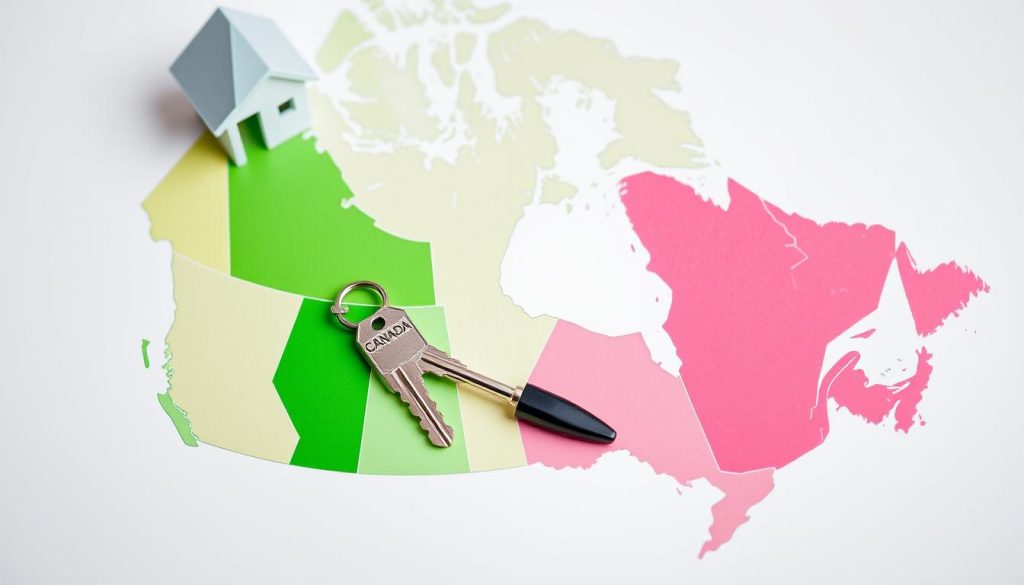Navigating the Canadian mortgage landscape can be complex, with each province and territory having its own unique regulations, market conditions, and mortgage options. Whether you’re buying your first home, renewing an existing mortgage, or looking to refinance, understanding the regional differences is crucial to securing the best possible terms for your situation.
This comprehensive guide breaks down everything you need to know about mortgages across all 13 Canadian provinces and territories, helping you make informed decisions no matter where you call home.
Understanding the Canadian Mortgage Landscape
Before diving into province-specific details, it’s important to understand some universal aspects of Canadian mortgages that apply nationwide:
Key Mortgage Scenarios
- New home purchases – Getting a mortgage for buying property
- Mortgage renewals – Renegotiating terms at the end of your term
- Refinancing – Accessing equity or changing mortgage structure
Common Mortgage Elements
- Down payment requirements (typically 5-20%)
- Mortgage default insurance for down payments under 20%
- Stress test qualification at higher interest rates
- Fixed vs. variable interest rate options
Find Your Best Mortgage Rate Today
Stop wondering if you’re getting the best deal. Get personalized mortgage rates tailored to your province and financial situation.
How Mortgages Differ Across Canadian Provinces
While federal regulations provide a framework for mortgages across Canada, provincial and territorial laws create significant differences in how mortgages work from region to region. These differences can impact everything from closing costs to foreclosure processes.
| Province/Territory | Land Transfer Tax | First-Time Buyer Programs | Foreclosure Process |
| Ontario | Provincial + Municipal (Toronto) | Land Transfer Tax Rebate | Power of Sale (faster) |
| British Columbia | Property Transfer Tax | PTT Exemption | Judicial Foreclosure |
| Alberta | None | Attainable Homes Program | Judicial Foreclosure |
| Quebec | Welcome Tax | Home Ownership Program | Judicial Foreclosure |
| Territories | Registration Fees | Northern Housing Programs | Varies by Territory |
These regional differences highlight why it’s essential to understand the specific mortgage landscape in your province or territory. Working with a mortgage provider that has expertise across all Canadian regions can help you navigate these complexities.
Ontario Mortgage Guide
As Canada’s most populous province, Ontario has a competitive mortgage market with some unique considerations for homebuyers and homeowners.
New Home Purchase in Ontario
Ontario’s real estate market, particularly in the Greater Toronto Area, can be highly competitive. First-time homebuyers should be aware of:
- Double land transfer tax in Toronto (provincial + municipal)
- First-time homebuyer rebates of up to $4,000 on provincial land transfer tax
- Higher average home prices requiring larger down payments
Mortgage Renewal in Ontario
When renewing your mortgage in Ontario, consider:
- Shopping around with different lenders, not just accepting your current lender’s offer
- Negotiating based on Ontario’s competitive mortgage market
- Considering the impact of property value increases on your renewal options
Refinancing in Ontario
Ontario homeowners looking to refinance should note:
- Maximum refinance of up to 80% of your home’s value
- Potential for significant equity access in high-appreciation markets like Toronto
- Legal fees and possible appraisal costs when switching lenders
Ontario Mortgage Rates
Ontario’s competitive mortgage market means rates can vary significantly between lenders. Don’t miss out on potential savings.
British Columbia Mortgage Guide
British Columbia’s housing market, particularly in Vancouver, presents unique challenges and opportunities for mortgage seekers.
New Home Purchase in BC
BC homebuyers should be aware of:
- Property Transfer Tax with first-time buyer exemptions for homes under $500,000
- Foreign buyer taxes in certain regions (20% in some areas)
- BC Home Partnership Program for down payment assistance
Mortgage Renewal in BC
When renewing in British Columbia:
- Consider the impact of BC’s property assessment values on your renewal
- Review options with credit unions, which are provincially regulated and may offer different terms
- Evaluate whether your home’s appreciation affects your renewal strategy
Refinancing in BC
BC homeowners considering refinancing should note:
- High property values may provide substantial equity access
- Provincial regulations regarding disclosure requirements
- Options for using equity for renovation in high-value markets
Alberta Mortgage Guide
Alberta’s mortgage landscape offers some advantages compared to other provinces, particularly regarding property transfer costs.
New Home Purchase in Alberta
Alberta homebuyers benefit from:
- No provincial land transfer tax (only registration fees apply)
- Generally more affordable housing markets compared to BC and Ontario
- Various down payment assistance programs through local initiatives
Mortgage Renewal in Alberta
When renewing your mortgage in Alberta:
- Consider how fluctuations in the provincial economy may affect interest rates
- Review your property’s current value in relation to local market conditions
- Explore options with Alberta-based credit unions and financial institutions
Refinancing in Alberta
Alberta homeowners looking to refinance should consider:
- How market volatility may affect property valuations
- Lower closing costs compared to provinces with land transfer taxes
- Options for consolidating debt or investing in property improvements
Quebec Mortgage Guide
Quebec’s unique legal system and French language requirements create a distinct mortgage environment compared to other provinces.
New Home Purchase in Quebec
Quebec homebuyers should be aware of:
- Welcome Tax (Taxe de Bienvenue) instead of land transfer tax
- Civil law system rather than common law affecting mortgage contracts
- Notary requirement for real estate transactions
Mortgage Renewal in Quebec
When renewing your mortgage in Quebec:
- Consider working with a notary to review renewal terms
- Be aware of French language requirements in documentation
- Explore provincial programs that may affect renewal options
Refinancing in Quebec
Quebec homeowners considering refinancing should note:
- Higher notary fees compared to lawyer fees in other provinces
- Unique provincial regulations regarding mortgage terms
- Different disclosure requirements under Quebec’s consumer protection laws
Quebec Mortgage Solutions
Navigate Quebec’s unique mortgage landscape with expert guidance and competitive rates.
Atlantic Provinces Mortgage Guide
New Brunswick, Nova Scotia, Prince Edward Island, and Newfoundland and Labrador each have their own considerations for mortgages.

New Brunswick
New Brunswick homebuyers should note:
- Provincial real property transfer tax of 1%
- More affordable housing markets compared to larger provinces
- Various rural property options with different mortgage considerations
Nova Scotia
In Nova Scotia, be aware of:
- Deed transfer tax varying by municipality (typically 1-1.5%)
- Growing Halifax market with different considerations than rural areas
- Provincial programs for first-time homebuyers
Prince Edward Island
PEI mortgage seekers should consider:
- Provincial real property transfer tax of 1%
- Non-resident ownership restrictions that may affect some buyers
- Seasonal property considerations for vacation homes
Newfoundland and Labrador
In Newfoundland and Labrador, note:
- Registration fees instead of land transfer tax
- Regional economic factors affecting property values
- Rural property considerations including services and accessibility
Prairie Provinces Mortgage Guide
Saskatchewan and Manitoba offer unique mortgage landscapes with their own advantages and considerations.
Saskatchewan
Saskatchewan homebuyers should be aware of:
- Land Titles fees instead of land transfer tax
- Affordable housing markets in major cities like Regina and Saskatoon
- Provincial programs for first-time homebuyers
Manitoba
In Manitoba, consider:
- Land Transfer Tax with rates from 0.5% to 2% based on property value
- First-time homebuyer rebate programs
- Stable housing market with moderate appreciation

Both provinces offer more affordable housing options compared to coastal markets, potentially allowing for lower mortgage amounts and faster payoff strategies.
Northern Territories Mortgage Guide
Yukon, Northwest Territories, and Nunavut present unique challenges and opportunities for mortgage seekers.
Unique Northern Considerations
- Higher construction and maintenance costs affecting property values
- Seasonal accessibility issues in some communities
- Special northern housing programs and incentives
- Limited lender options in remote communities
Territory-Specific Notes
- Yukon: Growing Whitehorse market with different considerations than rural areas
- Northwest Territories: Higher average incomes offsetting higher living costs
- Nunavut: Unique land lease arrangements in many communities

Northern homebuyers often benefit from specialized programs designed to address the unique challenges of northern homeownership, including higher building costs and extreme weather considerations.
Essential Mortgage Tips for All Canadians
New Home Purchase
- Get pre-approved before house hunting
- Budget for closing costs specific to your province
- Consider mortgage default insurance costs if down payment is under 20%
- Research provincial first-time buyer incentives
Mortgage Renewal
- Start shopping for rates 4-6 months before renewal
- Consider switching lenders for better terms
- Evaluate your current financial situation and goals
- Negotiate with your current lender using competitive offers
Refinancing
- Understand provincial closing costs for refinancing
- Calculate the break-even point for any penalties
- Consider how accessing equity aligns with financial goals
- Review tax implications for your specific use of funds

Find Your Best Provincial Mortgage Rate
Stop wondering if you’re getting the best deal in your province. Loanspot.ca compares rates from over 30 lenders to find you the best options based on your location and needs.
Provincial Mortgage Calculators
Understanding how your mortgage payments will look in different scenarios is crucial for making informed decisions. Our provincial mortgage calculators take into account regional factors that may affect your mortgage:
- Provincial land transfer taxes and fees
- Regional interest rate variations
- Local property tax estimates
- Provincial first-time buyer incentives
Using a calculator that accounts for provincial differences can give you a more accurate picture of your true homeownership costs, helping you budget more effectively no matter where you live in Canada.
Frequently Asked Questions About Provincial Mortgages
How do mortgage rates vary between Canadian provinces?
While base mortgage rates are generally similar across Canada, provincial economic conditions, competition among lenders, and regional risk factors can create slight variations. Urban centers typically offer more competitive rates due to higher competition, while remote areas may have fewer options and potentially higher rates. Additionally, some provincially-regulated credit unions may offer region-specific promotions.
What are the main differences in closing costs between provinces?
The biggest provincial difference in closing costs comes from land transfer taxes (or lack thereof). Ontario and British Columbia have significant land transfer taxes, while Alberta and Saskatchewan have only nominal registration fees. Quebec has the Welcome Tax, and other provinces have varying levels of transfer taxes or fees. Legal costs also vary, with Quebec requiring notaries instead of lawyers, often at different fee structures.
Can I use the same mortgage lender if I move between provinces?
Most national lenders operate across all provinces and territories, allowing you to stay with the same institution. However, you’ll need a new mortgage application as it’s a new property in a different jurisdiction. Some provincial credit unions may not offer services nationwide. When moving provinces, it’s a good opportunity to shop around for the best rates in your new location.
Are there provincial differences in mortgage default insurance requirements?
The basic requirement for mortgage default insurance (for down payments under 20%) is consistent across Canada as it’s federally regulated. However, some provinces offer programs to help with insurance premiums for first-time buyers. Additionally, in Quebec, mortgage insurance premium provincial sales tax cannot be added to the mortgage amount and must be paid upfront, unlike in other provinces.

Finding Your Ideal Provincial Mortgage Solution
Navigating the Canadian mortgage landscape requires understanding both national constants and provincial variations. From the unique legal system in Quebec to the absence of land transfer tax in Alberta, these regional differences can significantly impact your mortgage experience and overall costs.
No matter which province or territory you call home, having access to competitive rates and expert advice tailored to your local market is essential. Loanspot.ca specializes in connecting Canadians with the best mortgage options across all provinces and territories, taking into account regional factors that affect your mortgage terms.
Ready to Find Your Provincial Mortgage Solution?
Loanspot.ca compares rates from over 30 lenders to find you the best mortgage options based on your location and needs. Get started today with a free, no-obligation rate comparison.
Remember that mortgage rules and programs change regularly, so working with a service that stays current with provincial regulations and market conditions is your best strategy for securing optimal mortgage terms, whether you’re buying, renewing, or refinancing.



